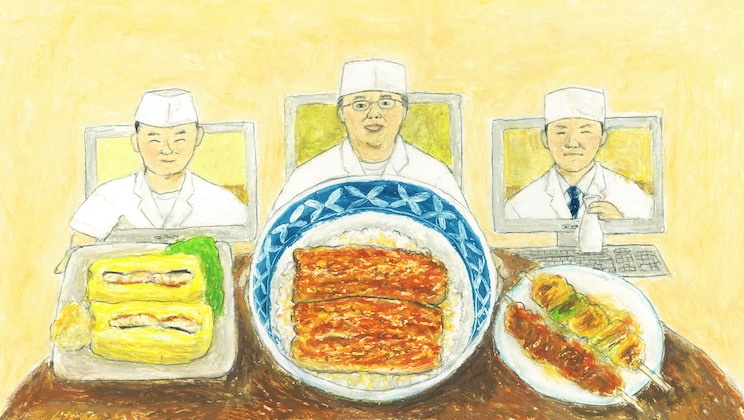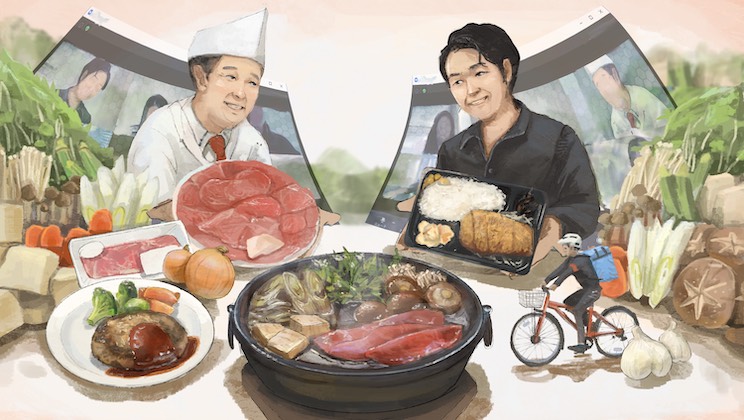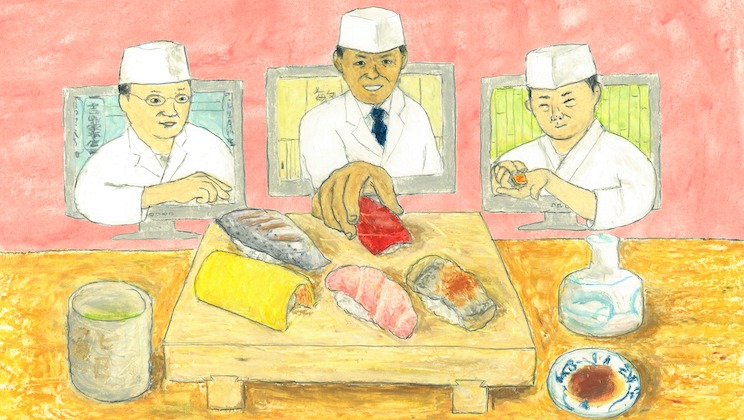Making the Workplace a Second Hometown. What Kind of City Does “Nihonbashi Friend” Aim to Build in Partnership with Workers?
Making the Workplace a Second Hometown. What Kind of City Does “Nihonbashi Friend” Aim to Build in Partnership with Workers?

“Nihonbashi Friend” is a non-profit organization that works to build new relationship potential between the workers of Nihonbashi and the region itself, under the slogan “Making the workplace a second hometown.” While enjoying “Asage” local restaurant breakfast delivery, the organization has worked on projects involving both businesses established in Nihonbashi for 100 years or more (the “past century”) and startups, creators, and others bringing fresh air to the area (the “next century”), working in a variety of ways to connect diverse people that have connections to the city. In this interview, we spoke with Mr. Takeshi Kawaji, the representative for Nihonbashi Friend at the time of its founding, as well as Mr. Takuro Shimizu, the current representative, about their thoughts on past group efforts and progress, as well as the city’s future.
Forming a Hub to Connect Workers and the City
-First off, would you please tell us about the events that led up to Nihonbashi Friend’s founding?
Mr. Takeshi Kawaji (Kawaji) : An internal, volunteer study group inside Mitsui Fudosan started it all. It was an era when we still didn’t have words for work style reforms, so you took the train to work early in the morning and worked late. That was a given for many employees, but then I just happened to wonder if there weren’t more ways we could be involved with the cities we worked in. And next, later, a media insider we invited to the study group talked about how “you don’t need a reason to love and enjoy the place where your company was founded, just like you don’t for your hometown.” Right then, I realized that there must be a lot of people working at companies who felt the same way, about places like right here, where Mitsui Fudosan was founded. That led to the idea for trying to create a location and a morning time when everyone with roots in Nihonbashi could actually gather together.

Mr. Takeshi Kawaji, the representative for Nihonbashi Friend at the time of the group’s founding
Mr. Takuro Shimizu (Shimizu): It’s been 20 years since both Kawaji and I joined the group, and at one point the city definitely had securities and pharmaceutical company employees in it, working, but fell silent at night, and almost no one came here on the weekends. Then, around when development for COREDO began, we established a Nihonbashi urban development department in Mitsui Fudosan. And when we mentioned urban development in Nihonbashi, which was like I described up until then, I started to wonder what would change “just from constructing buildings.” I felt that it was more important to have a wide variety of people from generational operators of established, family businesses to the people in office towers all learn about and get involved with Nihonbashi. And I felt we could become a hub for that.

Mr. Takuro Shimizu, the current representative and a participant in planning since the organization’s founding
Kawaji: Ultimately, the study group started within the company, but given that we could involve more varied types of people by working outside the company, rather than doing internal business, we ended up founding a non-profit. Even so, it wasn’t that we had an amazing idea or anything. There was a bit of personal benefit motive to it when we started “Asage Nihonbashi,” actually. We decided to have a one-shot event to start with, out of a simple thought that it would be fun to walk through the city while having breakfast, and talking to a variety of people. We didn’t advertise all that much, but we got more visitors than expected, and so we started talking about continuing for another 10 sessions through the end of that year. And from there, it just sort of kept going up to the present (laughter).
An Event with an Unvarnished View of Nihonbashi.
-It’s a very Nihonbashi-style concept isn’t it? Especially with the way the new and old players in the city appear, with the “past century” and “next century.”
Shimizu : Indeed it is. At the time, using morning time actively was popular, and there were already a number of events happening in various cities, so we tried a sort of undercover survey, too. Of the events, a number involved several of the presenters pitching their own morning activities to the city residents, but we felt that people with roots in Nihonbashi wanted something a bit different. So we formed concrete images for presenters we wanted, and it broke down into presenters from both new and old economic drivers, on its own. We were also strangely proud of how it was distinct from a typical “morning activity” event (laughter).

Already past its 80th session, “Asage Nihonbashi” always draws over 100 participants. (From the Nihonbashi Friend “Asage Nihonbashi” Facebook page)
Kawaji : In terms of our own style, we also value a relaxed atmosphere and humor. This was a while ago, but we’ve had times when people formed a line for the good seats in the front of venues. When that happened, we could’ve put out notes saying there was no admittance until the venue opened, whether you lined up or not. But we wanted to find a funnier way to put it, so we posted to Facebook that everyone who arrived at the venue more than 15 minutes early would need to wear Groucho glasses while they waited. That reduced the lines a bit, but then we started to get guys who wanted to wear the Groucho glasses and take selfies (laughter). But honestly, we wanted to see that sort of thing develop, a little bit.
-That story really conveys the Nihonbashi’s personality as a city.
Shimizu : Nihonbashi Friend is a non-profit because it’s easier to do things when incorporated, but it tends to drift toward the very earnest activity of non-profit urban development. We didn’t want to be seen that way, so we have a secret mission in the form of doing what we all want to, and being very serious about ridiculous things.
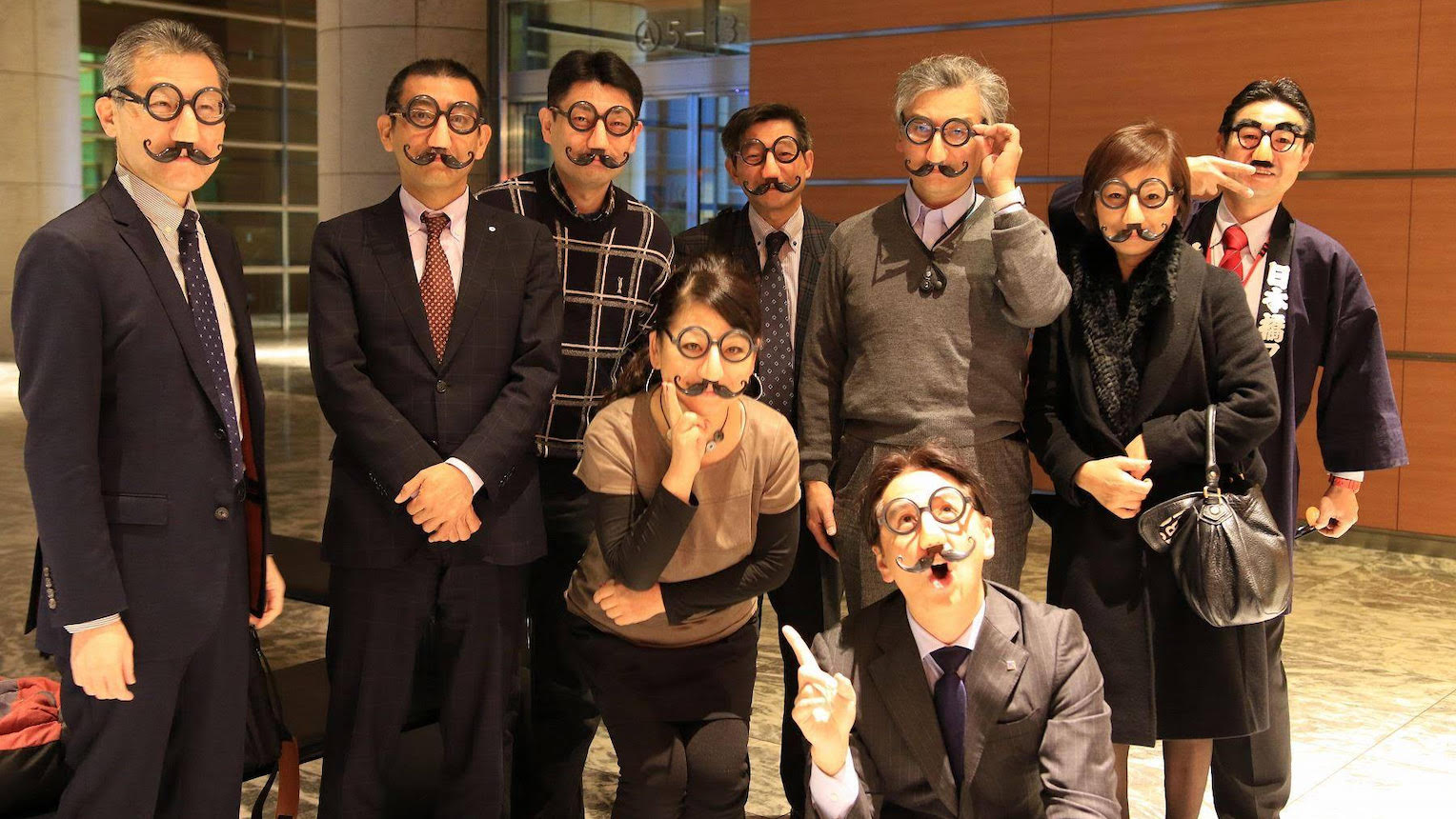
From the Nihonbashi Friend “Asage Nihonbashi” Facebook page
-How do you select the presenters for “Asage Nihonbashi”?
Shimizu : We still have a routine conference every Monday and discuss the decision there. We sometimes consult with local residents when we’re unsure. Also, we sometimes all go to new bars and restaurants, judge out timing carefully, and negotiate an event there, on the spot. At first, we sometimes fell all over ourselves due to not knowing how things worked in the city (laughter), but have gradually learned how to make good first impressions and so forth.
Kawaji : For the first three years or so, we had to explain what we were doing the events for or else people really wouldn’t understand, and we sometimes just got told to get out. But as we kept at it, we gradually gained recognition, and also got more introductions from people we had met before. More recently, we’ve actually been asked “when do I get a chance to present,” the other way around (laughter).
Shimizu: After a certain point, they started to invite Nihonbashi Friend to local festivals. We could carry the omikoshi mobile shrine wearing Mitsui Fudosan traditional happi coats, but rather than corporate coats, we borrow town council hanten coats labeled with “Honmachi X-chome” or “Muromachi X-chome” and so on. We also get invited to local New Year’s parties, as well, and feel like we’ve slowly come to be accepted as citizens of the region.
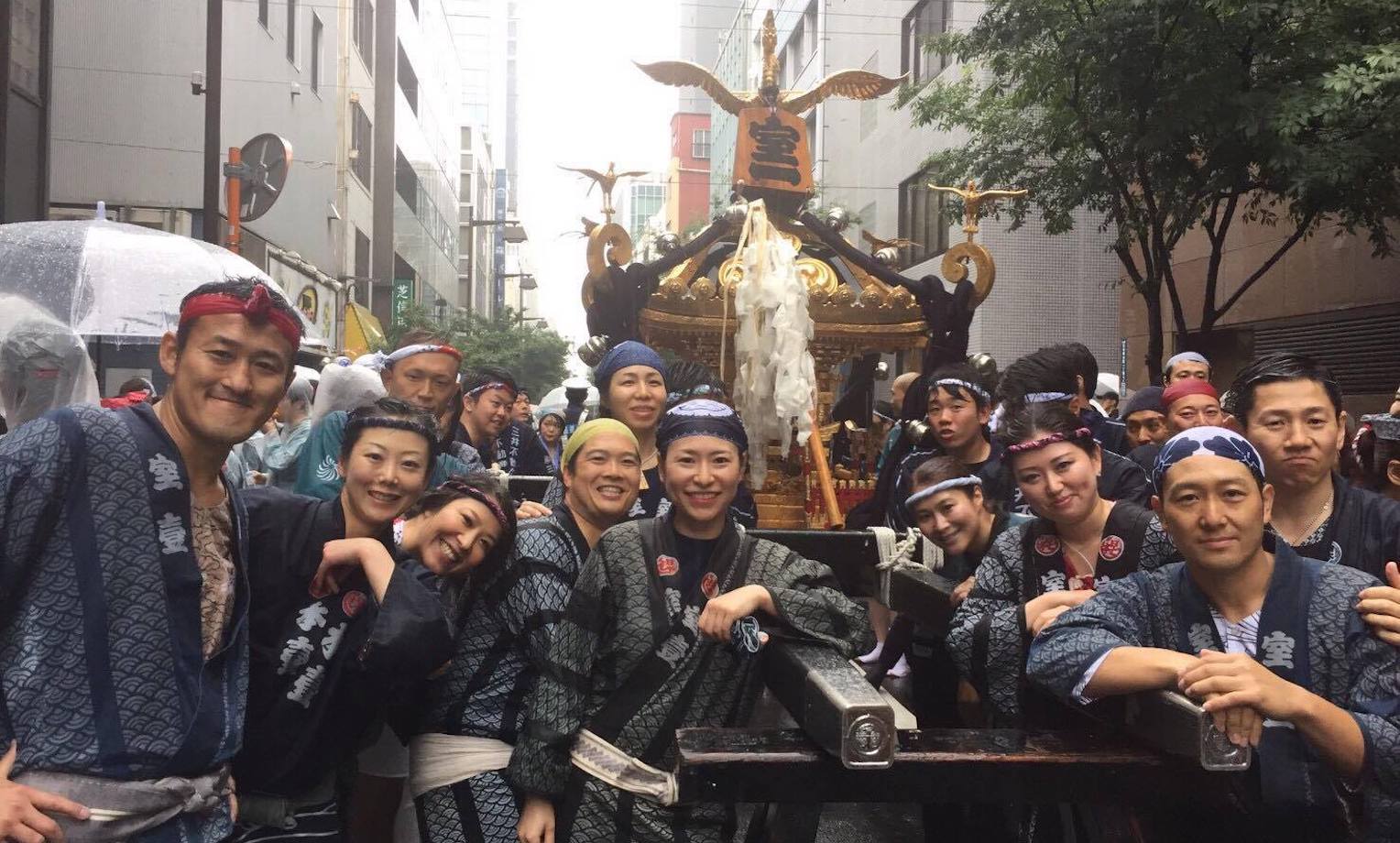
From the Nihonbashi Friend “Asage Nihonbashi” Facebook page
A Place for Interactions the City Cannot Do Without.
-You talked about how “Asage Nihonbashi” was for your own benefit, initially, but by this point it feels like a place for interactions that are very important to the city’s residents.
Kawaji : At one point, some of our regulars got to talking about how “we only see each other here.” On seeing that our regulars included both corporate employees and established small business owners, we realized how important the regular meetings were, and it strengthened my feelings that we have to continue them. For the 39th Asage, the delivery bento boxed lunch company “Benmatsu” created a very nice book of messages from past presenters, telling us “you guys are doing good.” They also said “it cost an absolute ton” when they did (laughter), but I almost cried manly tears, really.
Shimizu: We wanted to repay them somehow, which led to discussing everyone buying 100 Benmatsu bentos together. But we wouldn’t be able to finish them if we ordered them all at once, so we decided that all the group members would just keep buying them until we had bought 100 over time. We also posted the bentos we ate on our Facebook page. But Benmatsu isn’t on Facebook, so at the end we printed the page and gave it to them. But we also told them “we’ve eaten a lot of your food, but your disposable chopsticks are really fragile, Benmatsu” as we did, which led them to upgrade their chopsticks after using the same type for years (laughter). We’ve done a lot of things out of a sense that “this might be funny to try, here.” It’s not just that one episode.
-What sort of people are involved in running Nihonbashi Friend?
Kawaji : The starting team all knew each other very well, but since then, almost everyone involved was motivated by participating in Asage. There’s some turnover, but if you include OB and OG, we probably have around 100 people involved.
Shimizu : After being active for long enough, we’ve gotten to the point where we get consulted about issues with the city. And since we have people with diverse skillsets on our team, we’ve come to handle that in a pro bono way. For example, when someone asked us for a design for the temporary barriers around a construction site, we decided to photograph and use portraits of 100 people who work in Nihonbashi. That gave rise to the “TOKYO 24 CITIES – NIHONBASHI” project, and more.
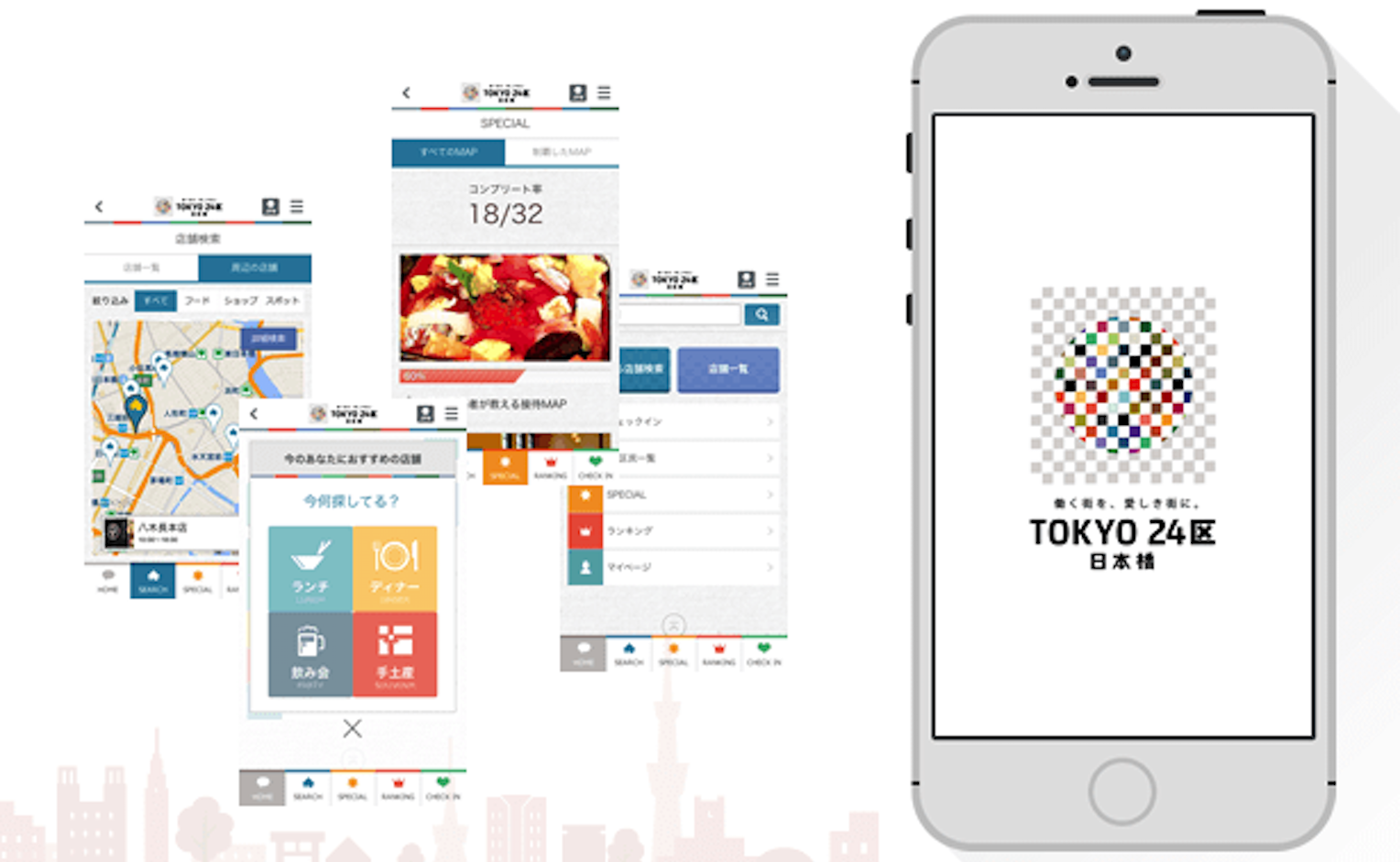
They also share information using an app with “TOKYO 24 CITIES – NIHONBASHI” (from the “TOKYO 24 CITIES – NIHONBASHI” homepage)
A City With Workers Whose Faces You Can See.
-Asage Nihonbashi is now entering its ninth year; has the makeup of your participants changed over time?
Kawaji : It doesn’t change much. About half of the attendees at each session are new, and the breakdown is about 50 percent corporate employees, 20 percent business owners, and the remainder as freelancers or similar. What I find fascinating is that the gap in knowledge is steadily diminishing over time between the corporate employees and operators of longstanding businesses, both among those that have attended for a long time. When I stopped to notice, we have around 20 corporate employees who now know small business owners well enough to go drinking and golfing together.
Shimizu : The established small business owners could be described as proudly independent, and have a conservative image when viewed from the outside, so we tend to assume they’d be hard to get to know. But some of them actively want to be more open, and a fair number of them are just shy and don’t know how to manage that. I think that’s precisely why I think it’s very important to create opportunities like Asage and connect people who are involved with the city as workers, with people who have always lived here.

A presentation underway at “Asage Nihonbashi” (From the Nihonbashi Friend “Asage Nihonbashi” Facebook page)
Kawaji : In the past, the owner and operator of an established sushi restaurant told me that “in the old days, the long-standing businesses were closer to their workers.” And even now, they want new ways to connect. But I feel like with the size and history of the area, in particular, they need someone to act as a guide to connect the two sides.
Shimizu : This isn’t so much about the 20 corporate employees we mentioned earlier, but I feel like it would be easier to move through the city if we had people to act as guides inside a variety of companies. Really, workers – with corporate employees at their forefront – should be players in the city, but they haven’t really been connected to the city up to now. It’s good for the workers employed in a city to be faces you know, and I think it improves the city’s value to have a place where individual workers can take the spotlight and speak their minds.
Kawaji : I feel like established small business owners use their faces in place of noren shop curtains, in some ways. And it would be interesting for the operators of convenience stores and commercial buildings in Nihonbashi to become more prominent faces, in the same way. For example, I think it would be wonderful if values took root that said it was natural for someone to be connected to the city as well as work at a shop, if they became a manager of a tenant store in COREDO. It would be great for the city to be filled with unique workers whose faces you knew, regardless of whether they worked at a traditional small business or a chain.
Shimizu : Lately, when long-standing businesses in Nihonbashi change generations in management, they sometimes introduce the successor to us. We also inversely sometimes take young new hires to business for introductions, and I think it would be nice if that sort of relationship were more common in the city.
Things That Are Possible Precisely Because We Are a Non-Profit.
-I’ve heard that “Asage Nihonbashi” will be ending as of its 100th session.
Kawaji : Going with the moment during our 50th session, I said that “we’ll be ending after another 50.” I was half-joking at the time, but being able to see a big conclusion ahead somewhat forces you to continue until then, and it also got people in the city saying that “I want to speak soon, if there are only 50 more sessions.”
Shimizu : Even though we do have some turnover, our managing team members are aging, and honestly, they sometimes get winded on us midway through things (laughter). Non-profits like us don’t grow on a revenue basis, and we’re not connected by blood, so it’s not simple to maintain an organization. Even though Asage is ending, we’re not closing down as a group, so we have to be thinking about the future.

Breakfast from a local restaurant or bar is served at “Asage Nihonbashi” (From the Nihonbashi Friend “Asage Nihonbashi” Facebook page)
-I’m told that the 100th Asage will be this December, but do you already have an idea in mind for it?
Kawaji : We’ve had all sorts of ideas, like holding it from morning until evening. We want it to be a really substantial final event that gives people something to chew on, and we have a lot of people thinking about it, including OB and OG. Rather than just getting sentimental, it might be better to be serious at the end… We talk about that sort of thing, but after celebrating out 100th session, we might just take a beat, turn around, and hold “Season 2” the next month, as usual (laughter).
Shimizu : I’ve had various vague thoughts about the 100th session for about a year and a half, but ultimately it’s very like us not to have anything resolved at this point (laughter). Personally, I don’t want to make it into a debate about “we have to do this because it’s our 100th session.” The longer someone has been a team member, the more they tend to talk about how things have to be a certain way. It might show just how much people share values within the group, but in the end, I want Nihonbashi Friend to stay an organization that lets each team member work on what they want.

Based on a concept of broadcasting information on all of Japan from Nihonbashi - the former hub of the Edo Five Routes that connected medieval Japan - the “Nihonbashi 46 DoFuKen” project shares appealing points about 46 prefectures (designated variously “Do,” “Fu,” and “Ken”, excluding Tokyo) in a relay format. (From the “Nihonbashi 46 DoFuKen” Facebook page)
Kawaji : Once, someone at a party pressed me on the question of what we want to become, in our activities. One of the next century types there bailed me out, saying “putting what you want to become aside, if you’re doing it because it’s fun, that’s enough, isn’t it?” I think people around us often wonder about our objectives and results, but we’re not doing this as a company. So honestly, we don’t plan all that much (laughter). We want to continue being a group that’s content if someone was happy we did what we did, and that’s why we’ve never had dedicated staff assignments.
Shimizu : All sorts of things happen when they happen, and it feels like almost 10 years have passed with us just fixing the issues that made sense to fix at the time. So going forward, all sorts of things will probably continue to happen. We haven’t set any specific goals in particular, but personally, I feel I’ve always wanted to be involved with this city, both in my time as a corporate employee and as a non-profit representative. It’s just that corporate employs tend to be bound by corporate arguments, and I think it’s better to work with a non-profit if you want to personally commit to the city.
Kawaji : Looking back, I’m glad I got to have another side to myself, distinct from me as a corporate employee. Coming from an era when people weren’t even really aware of second jobs or side roles, it reminds me that going all sorts of places in the name of a non-profit was an absolutely great experience.
Interview and text: Yuki Harada (Qonversations), Photography: Daisuke Okamura
Nihonbashi Friend
A group that seeks a new form of worker-led urban development in Nihonbashi, a city with 460,000 workers in just a one-kilometer radius. They promote a variety of worker-centric projects in the interest of urban development for flexible interconnection between diverse elements such as workers, established small businesses and their owners, creators, visitors, and more.

